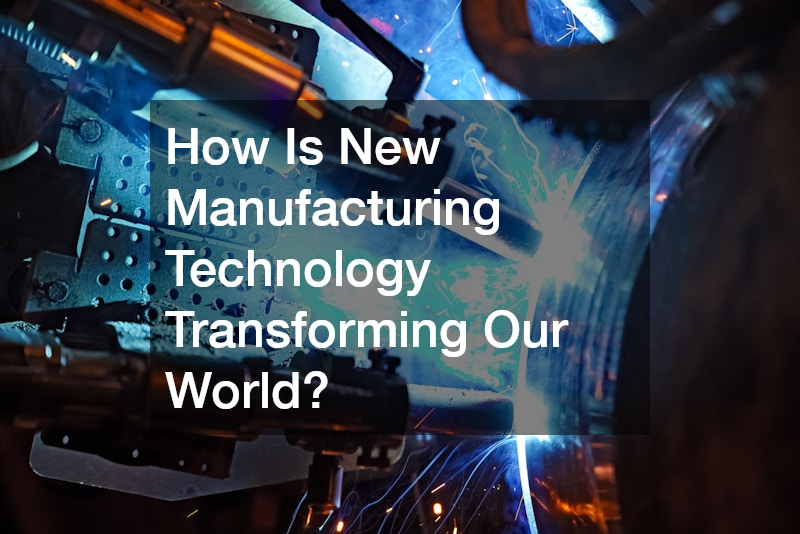

1. What is innovative manufacturing technology?
New manufacturing technology refers to the latest advancements and innovations in the manufacturing industry that are revolutionizing the way products are designed, produced, and delivered to the market. This includes cutting-edge technologies such as 3D printing, robotics, artificial intelligence, and Internet of Things (IoT) devices that are reshaping the traditional manufacturing processes.
Key features of innovative manufacturing technology include increased automation, improved precision, higher efficiency, and greater flexibility in production. These technologies are enabling manufacturers to create more complex and customized products at a faster pace while reducing costs and minimizing waste.
With innovative manufacturing technology, companies can now produce high-quality goods with greater speed and accuracy, leading to enhanced competitiveness in the global market.
2. How is innovative manufacturing technology different from traditional manufacturing methods?
New manufacturing technology differs from traditional methods in several ways, primarily in terms of processes and outcomes. Traditional manufacturing relies heavily on manual labor and often involves long production cycles, whereas new technology incorporates automation and digitalization to streamline operations.
One major difference is the impact on efficiency and productivity. New manufacturing technology allows for faster production cycles, reduced downtime, and improved quality control, leading to higher output levels and better overall performance.
Moreover, new technology enables manufacturers to respond quickly to changes in market demands, customize products on a large scale, and adapt to evolving consumer preferences more effectively than traditional methods.

3. What are the main applications of innovative manufacturing technology?
Various industry sectors are benefiting from innovative manufacturing technology, including automotive, aerospace, electronics, healthcare, and defense. These technologies are being used to design and produce a wide range of products, from high-tech components to consumer goods.
Specific use cases in manufacturing include a custom golf cart seat manufacturing service using advanced CNC machines, a PET preform manufacturer for the packaging industry, and the custom laser cutting of industrial supplies for various applications. Companies are also leveraging new technology to optimize their production processes, reduce lead times, and enhance product quality.
New manufacturing technology is driving innovation across multiple industries, enabling businesses to stay ahead of the competition and meet the demands of a rapidly changing market.
4. How is innovative manufacturing technology improving sustainability?
New manufacturing technology is playing a crucial role in promoting sustainability by reducing waste and emissions in the production process. By implementing advanced technologies such as CNC equipment and robotics, manufacturers can minimize material wastage and energy consumption, leading to a more environmentally friendly manufacturing process.
Additionally, the integration of renewable energy sources such as solar power and wind energy in manufacturing facilities is further enhancing sustainability efforts. Companies are investing in eco-friendly practices to reduce their carbon footprint and contribute to a cleaner and greener environment.
By embracing innovative manufacturing technology, businesses can achieve a balance between economic growth and environmental conservation, paving the way for a more sustainable future.

5. What are the challenges of implementing innovative manufacturing technology?
One of the main challenges of implementing innovative manufacturing technology is the initial investment required to adopt these advanced systems and equipment. Companies may face significant costs associated with purchasing and installing new machinery, training employees, and integrating technology into existing production lines.
Another challenge is the need for upskilling and reskilling the workforce to operate and maintain the new technology effectively. Training programs and continuous learning initiatives are essential to ensure that employees are equipped with the necessary skills to leverage innovative manufacturing technology and drive innovation within the organization.
Despite these challenges, the benefits of implementing innovative manufacturing technology far outweigh the costs, with improved efficiency, productivity, and competitiveness being the ultimate rewards for companies that embrace innovation.
6. How is innovative manufacturing technology enhancing product customization?
New manufacturing technology is revolutionizing product customization by offering consumers a wide range of personalized options and configurations. With advanced CNC machines and automated production processes, companies can efficiently produce custom-designed products tailored to meet individual preferences and requirements.
From custom golf cart seats to bespoke industrial building design models, manufacturers are leveraging technology to deliver unique and innovative solutions to their customers. The flexibility and scalability of innovative manufacturing technology enable companies to respond quickly to changing market trends and deliver customized products with greater speed and accuracy.
By embracing product customization through new technology, businesses can enhance customer satisfaction, build brand loyalty, and differentiate themselves in a highly competitive market landscape.
7. What role does artificial intelligence play in innovative manufacturing technology?
Artificial intelligence (AI) plays a pivotal role in innovative manufacturing technology by driving automation and optimization in production processes. AI algorithms are used to analyze complex data sets, predict maintenance needs, optimize supply chain operations, and enhance quality control in manufacturing facilities.
AI-driven automation enables manufacturers to streamline their operations, reduce human errors, and improve overall efficiency. By leveraging machine learning and cognitive computing, companies can achieve higher levels of productivity and precision in their manufacturing processes.
As AI continues to evolve, its applications in manufacturing are becoming more advanced, leading to smarter factories and more agile production systems that can adapt to changing market dynamics and customer demands.

8. How are 3D printing technologies revolutionizing manufacturing?
3D printing technologies are revolutionizing manufacturing by offering a cost-effective and efficient alternative to traditional production methods. With 3D printing, manufacturers can create complex geometries, rapid prototypes, and custom parts with minimal material wastage and reduced lead times.
The advantages of 3D printing over traditional methods include the ability to produce intricate designs, reduce production costs, and optimize supply chain logistics. Companies are using 3D printing for a wide range of applications, from rapid prototyping to on-demand manufacturing of spare parts.
Ideas for future applications of 3D printing include the production of customized consumer goods, medical implants, and even entire buildings using advanced additive manufacturing techniques. 3D printing is unlocking new possibilities in manufacturing and reshaping the way products are designed and produced.
9. What is the impact of new manufacturing technology on job opportunities?
The adoption of innovative manufacturing technology is changing the skill requirements in the industry, leading to a shift towards more technologically advanced roles. As automated systems and robots take on repetitive tasks, there is a growing demand for employees with digital literacy, problem-solving skills, and expertise in operating CNC equipment and other advanced machinery.
While some traditional manufacturing jobs may be displaced by automation, new technology is also creating new job opportunities in areas such as data analytics, cybersecurity, and robotics engineering. Companies are investing in workforce development programs to upskill their employees and prepare them for the jobs of the future.
Overall, innovative manufacturing technology has the potential to transform the workforce by creating new avenues for innovation, collaboration, and career growth in the industrial sector.
10. How is innovative manufacturing technology contributing to global supply chains?
New manufacturing technology is enhancing global supply chains by improving efficiency in logistics and distribution processes. With real-time data analytics, IoT devices, and automated systems, companies can optimize their supply chain operations, reduce lead times, and minimize inventory costs.
Public warehousing facilities are adopting advanced technology to increase visibility and traceability of products throughout the supply chain, ensuring smooth inventory management and timely deliveries. By leveraging cloud-based platforms and centralized data systems, manufacturers can synchronize production schedules with demand forecasts and respond quickly to market fluctuations.
New technology is also enhancing the resilience of supply chains in times of disruption, enabling businesses to mitigate risks, adapt to changing market conditions, and maintain operational continuity during unforeseen events.
11. What are some examples of successful implementation of innovative manufacturing technology?
Several companies are leading the way in technology adoption and demonstrating the transformative power of new manufacturing technology. For instance, a trailer manufacturer has implemented IoT devices and predictive maintenance algorithms to optimize its production processes and reduce downtime.
Contract manufacturing firms are leveraging AI-driven automation to improve quality control and enhance operational efficiency in their facilities. By integrating smart sensors and robotics into their operations, these companies are able to achieve higher levels of productivity and accuracy in manufacturing custom products.
Lessons learned from successful transformations in manufacturing include the importance of investing in innovation, building a culture of continuous improvement, and fostering collaboration between cross-functional teams to drive digital transformation and achieve sustainable growth in a competitive market.

12. How is cybersecurity addressed in innovative manufacturing technology?
Protecting data and systems in manufacturing is crucial to safeguarding against cyber threats and ensuring the resilience of smart factories. Manufacturers are implementing robust cybersecurity measures such as network segmentation, encryption, and access control to secure their industrial systems and prevent unauthorized access.
Strategies for mitigating cyber threats in smart factories include regular security audits, employee training on cybersecurity best practices, and the implementation of incident response plans. By proactively addressing cybersecurity risks, companies can minimize the potential impact of cyber attacks on their operations and protect sensitive data from breaches.
Ensuring the security and integrity of manufacturing processes is essential for maintaining trust with customers, suppliers, and stakeholders and safeguarding against potential disruptions in production due to cyber incidents.
13. What are the future trends in manufacturing technology?
Emerging technologies such as IoT, blockchain, and virtual/augmented reality (VR/AR) are shaping the future of manufacturing and driving innovation in the industry. IoT devices are enabling connected factories that can communicate in real-time, optimize production flows, and predict maintenance needs.
Blockchain technology is revolutionizing supply chain management by providing a secure and transparent system for tracking and verifying transactions across the manufacturing network. By leveraging blockchain, companies can enhance traceability, reduce counterfeiting, and improve data integrity in their supply chains.
VR/AR technologies are transforming the way products are designed, prototyped, and visualized in virtual environments, allowing manufacturers to test and optimize product concepts before physical production. These trends are reshaping the manufacturing landscape and paving the way for a more interconnected, efficient, and sustainable industry.
14. How is innovative manufacturing technology influencing global competition?
The rise of smart manufacturing as a competitive advantage is reshaping the global industrial landscape, with companies leveraging advanced technology to gain a strategic edge in the market. By investing in automation, AI, and digitalization, manufacturers can enhance their production efficiency, reduce costs, and deliver superior quality products to customers.
International collaboration and competition in technology innovation are driving companies to adopt innovative manufacturing technology to stay ahead of the curve and meet the demands of a globalized market. By embracing innovation and continuous improvement, businesses can position themselves as leaders in the industrial sector and drive sustainable growth in the long run.
The competitive landscape in manufacturing is evolving rapidly, with technology playing a critical role in shaping the future of the industry and determining the success of companies in a hyper-competitive market environment.
15. What are the ethical considerations surrounding manufacturing technology?
As automation and digitalization continue to transform the manufacturing industry, ethical considerations around employment, data privacy, and technology usage are becoming increasingly important. The implications of automation on employment dynamics raise questions about the impact on workers and the need for upskilling programs to support the workforce transition.
Ethical use of data and technologies in manufacturing processes is another key concern, with companies needing to prioritize data security, privacy, and transparency in their operations. Ensuring fair treatment of employees, respecting intellectual property rights, and promoting sustainable practices are essential ethical considerations for manufacturers adopting new technology.
By upholding ethical standards and values in their operations, companies can build trust with stakeholders, create a positive work environment, and contribute to the long-term sustainability of the manufacturing industry.
In conclusion, manufacturing technology is transforming our world by driving innovation, enhancing efficiency, and shaping the future of the industrial sector. From custom golf cart seat manufacturing services to trailer manufacturers, companies across various industries are embracing advanced technology to stay competitive, reduce costs, and meet the demands of a rapidly changing market.
The benefits of new manufacturing technology, including improved sustainability, enhanced product customization, and global supply chain optimization, are paving the way for a more interconnected, efficient, and sustainable industry. By addressing challenges, embracing emerging trends, and upholding ethical considerations, manufacturers can drive sustainable growth, foster innovation, and secure a competitive edge in the global marketplace.






